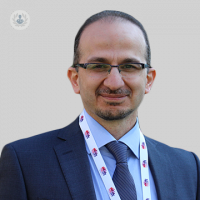"Why this is the best weight loss surgery for you – what I would choose for you as your obesity surgeon”
Written in association with:There are many different things which must be considered when deciding on the right path to follow for weight loss surgery. Top bariatric surgeon Mr Ali Alhamdani explains how he decides the best course of action and procedure for the patient.

How your obesity surgeon helps you to make the right choice
Consider patient eating habits
Patients eat differently: they are either large volume eaters, sweet eaters or combination of both. Knowing this is paramount in the decision-making process since each bariatric operation has its limitations with regards to its ability to induce weight loss. For example, sleeve gastrectomy and gastric band are restrictive operations - their impact on soft and sweet food is limited and therefore we could not expect significant weight loss if a ‘sweet eating person’ is offered a sleeve gastrectomy.
Another example: gastric bypass or mini gastric bypass could cause dumping syndrome for sweet eaters (when sugar moves to the small bowel from the stomach too quickly, causing cramps and diarrhoea), therefore patient knowledge and understanding of their diet habits would help in their recovery. Although this is often mentioned as one of the side effects of this procedure, I believe it is an advantage: it will force the sweet eating patient to switch to the healthy Mediterranean type of food. This dumping syndrome occurs in 40% of gastric bypass patients.
Assess the medical history of the patient
Past medical history affects the choice of the operation. For example, patients with severe gastroesophageal reflux and hiatus hernia should not have an operation that exerts high pressure on an already weakened gastroesophageal junction. Sleeve gastrectomy transfers the low-pressure volume stomach sack into a high-pressure system stomach tube. This will encourage the reflux of acid in the already damaged gastroesophageal sphincter mechanism in a patient with gastroesophageal reflux.
Another example illustrating medical history - patients with inflammatory bowel disease like Crohn’s or ulcerative colitis should not be offered obesity surgery that might affect the disease process or interfere with the treatment options. Therefore, I would not offer gastric bypass or mini gastric bypass to such patients.
Keep the patient’s thoughts and beliefs in mind
Some of my patients come and ask specifically for only one operation. I will support offering the patient their choice as long as it will not cause them any harm. For example, some patients would like only the gastric band - and nothing but the band. They believe it is a very safe operation.
This is one of the misconceptions patients have. Problems with the gastric band will not happen in the initial years after the operation. The longer the patient lives with the band the more chance there is of having complications like band erosions and slippages. Some of those complications are life-threatening. One way around this could be to offer a gastric sleeve/ bypass or mini bypass, as if a complication is to happen with those operations it will happen early. The longer the patient lives with these operations the safer they are.
It is important to me as a surgeon to listen to my patients, but it is also important for me to point out any possible risks and give my recommendations while taking into account their beliefs surrounding surgery.
Follow the Surgeons Act
Some surgeons believe in only one solution for all patients. Those surgeons believe, for example, in offering only gastric sleeve to all patients, and some believe in offering a gastric bypass to all patients.
I believe that the surgeon should take all the factors above into consideration and only decide after discussing it with the patients and involving them in the decision-making process. This ensures we choose the best course of surgical treatment for the patient.


